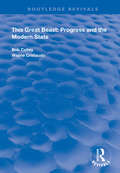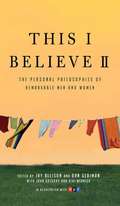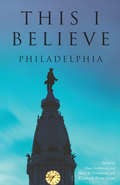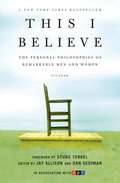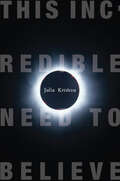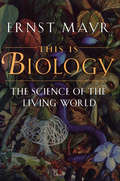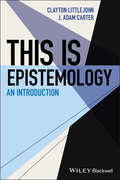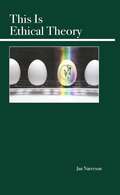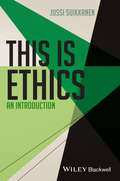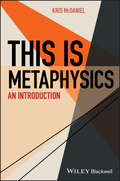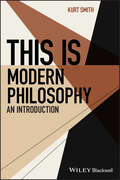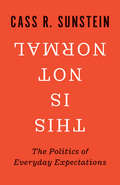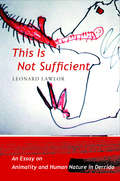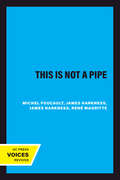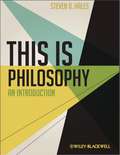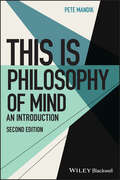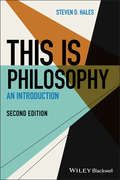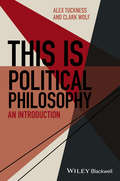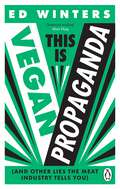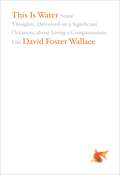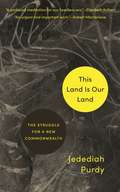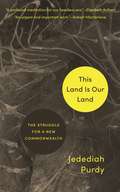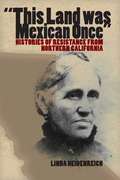- Table View
- List View
This Great Beast: Progress and the Modern State (Routledge Revivals)
by R. Catley W. CristaudoFirst published in 1997, this volume follows Catley and Cristaudo as they defend Western Civilization against all comers: against the rest of the world, especially the Third World, and against its own internal irritants: ‘the scribblings of the intelligentsia’ by idealist philosophers, feminists, greens, post-moderns, multiculturalists, Orientalists, anti-nationalists, socialists and Keynesians, most of them tenured academics in the arts and social sciences. As academic political scientists themselves they have done time in a number of the ideological prisons they attack, and they write about those states of mind with experienced cynicism ... As in Paradise Lost, the devil gets all the best tunes. The identification of civilization’s enemies is wildly, sometimes hilariously, politically incorrect.
This I Believe II: The Personal Philosophies of Remarkable Men and Women
by Dan Gediman Jay AllisonFeaturing 80 Americans--from the famous to the unknown--this series of insightful observations completes the thought that the book's title introduces. Each piece compels readers to rethink not only how they arrive at their own personal beliefs but also how they share them with others.
This I Believe: Philadelphia
by This I Believe, Inc.An essay collection highlighting guiding principles, containing 30 works from the contemporary Philadelphia radio series, and 30 from the 1950s original.This I Believe is an international project engaging people in writing, sharing, and discussing the core values that guide their daily lives. And it all started in Philadelphia more than seven decades ago with a local radio series that became an international sensation.This book features thirty essays from that original 1950s This I Believe radio series, including contributions from publisher and philanthropist Walter Annenberg, classicist and educator Edith Hamilton, anthropologist Margaret Mead, and Pulitzer Prize–winning author James Michener.Complementing those historical selections are thirty contemporary essays produced through a partnership among This I Believe, WHYY, and Leadership Philadelphia. These essayists include Philadelphia Inquirer columnist Frank Fitzpatrick, Grammy Award–winner Kenny Gamble, Philadelphia Mural Arts Program executive director Jane Golden, and Mayor Michael Nutter.Altogether, this collection is an insightful reflection of the guiding principles that drive the people of Philadelphia, who believe in brotherly love—and so much more.
This I Believe: The Personal Philosophies of Remarkable Men and Women
by Viki Merrick John Gregory Dan Gediman Jay AllisonBased on the NPR series of the same name, This I Believe features eighty Americans--from the famous to the unknown--completing the thought that the book's title begins. Each piece compels readers to rethink not only how they have arrived at their own personal beliefs but also the extent to which they share them with others. Featuring many renowned contributors--including Isabel Allende, Colin Powell, Gloria Steinem, William F. Buckley Jr., Penn Jillette, Bill Gates, and John Updike--the collection also contains essays by a Brooklyn lawyer; a part-time hospital clerk in Rehoboth, Massachusetts; a woman who sells yellow pages advertising in Fort Worth, Texas; and a man who serves on Rhode Island's parole board.The result is a stirring and provocative trip inside the minds and hearts of a diverse group of people whose beliefs--and the incredibly varied ways in which they choose to express them--reveal the American spirit at its best.
This Incredible Need to Believe (European Perspectives)
by Julia Kristeva&“A sprawling analysis of religion in major psychological and philosophical literature, fiction and in private life . . . compelling and remarkable.&”—Publishers Weekly &“Unlike Freud, I do not claim that religion is just an illusion and a source of neurosis. The time has come to recognize, without being afraid of &‘frightening&’ either the faithful or the agnostics, that the history of Christianity prepared the world for humanism.&” So writes Julia Kristeva in this provocative work, which skillfully upends our entrenched ideas about religion, belief, and the thought and work of a renowned psychoanalyst and critic. With dialogue and essay, Kristeva analyzes our &“incredible need to believe&”—the inexorable push toward faith that, for Kristeva, lies at the heart of the psyche and the history of society. Examining the lives, theories, and convictions of Saint Teresa of Avila, Sigmund Freud, Donald Winnicott, Hannah Arendt, and other individuals, she investigates the intersection between the desire for God and the shadowy zone in which belief resides. Kristeva suggests that human beings are formed by their need to believe, beginning with our first attempts at speech and following through to our adolescent search for identity and meaning. Kristeva then applies her insight to contemporary religious clashes and the plight of immigrant populations. Even if we no longer have faith in God, Kristeva argues, we must believe in human destiny and creative possibility. Reclaiming Christianity&’s openness to self-questioning and the search for knowledge, Kristeva urges a &“new kind of politics,&” one that restores the integrity of the human community. &“A helpful commentary and introduction to Kristeva&’s major work over the last two decades.&”—Choice
This Incredible Need to Believe (European Perspectives: A Series in Social Thought and Cultural Criticism)
by Julia Kristeva"Unlike Freud, I do not claim that religion is just an illusion and a source of neurosis. The time has come to recognize, without being afraid of 'frightening' either the faithful or the agnostics, that the history of Christianity prepared the world for humanism."So writes Julia Kristeva in this provocative work, which skillfully upends our entrenched ideas about religion, belief, and the thought and work of a renowned psychoanalyst and critic. With dialogue and essay, Kristeva analyzes our "incredible need to believe"--the inexorable push toward faith that, for Kristeva, lies at the heart of the psyche and the history of society. Examining the lives, theories, and convictions of Saint Teresa of Avila, Sigmund Freud, Donald Winnicott, Hannah Arendt, and other individuals, she investigates the intersection between the desire for God and the shadowy zone in which belief resides. Kristeva suggests that human beings are formed by their need to believe, beginning with our first attempts at speech and following through to our adolescent search for identity and meaning. Kristeva then applies her insight to contemporary religious clashes and the plight of immigrant populations, especially those of Islamic origin. Even if we no longer have faith in God, Kristeva argues, we must believe in human destiny and creative possibility. Reclaiming Christianity's openness to self-questioning and the search for knowledge, Kristeva urges a "new kind of politics," one that restores the integrity of the human community.
This Is Biology: The Science of the Living World
by Ernst MayrBiology until recently has been the neglected stepchild of science, and many educated people have little grasp of how biology explains the natural world. Yet to address the major political and moral questions that face us today, we must acquire an understanding of their biological roots. This magisterial new book by Ernst Mayr will go far to remedy this situation. An eyewitness to this century’s relentless biological advance and the creator of some of its most important concepts, Mayr is uniquely qualified to offer a vision of science that places biology firmly at the center, and a vision of biology that restores the primacy of holistic, evolutionary thinking. As he argues persuasively, the physical sciences cannot address many aspects of nature that are unique to life. Living organisms must be understood at every level of organization; they cannot be reduced to the laws of physics and chemistry. Mayr’s approach is refreshingly at odds with the reductionist thinking that dominated scientific research earlier in this century, and will help to redirect how people think about the natural world. This Is Biology can also be read as a "life history" of the discipline--from its roots in the work of Aristotle, through its dormancy during the Scientific Revolution and its flowering in the hands of Darwin, to its spectacular growth with the advent of molecular techniques. Mayr maps out the territorial overlap between biology and the humanities, especially history and ethics, and carefully describes important distinctions between science and other systems of thought, including theology. Both as an overview of the sciences of life and as the culmination of a remarkable life in science, This Is Biology will richly reward professionals and general readers alike.
This Is Epistemology: An Introduction (This is Philosophy)
by Clayton Littlejohn J. Adam CarterWhat is knowledge? Why is it valuable? How much of it do we have (if any at all), and what ways of thinking are good ways to use to get more of it? These are just a few questions that are asked in epistemology, roughly, the philosophical theory of knowledge. This is Epistemology is a comprehensive introduction to the philosophical study of the nature, origin, and scope of human knowledge. Exploring both classic debates and contemporary issues in epistemology, this rigorous yet accessible textbook provides readers with the foundation necessary to start doing epistemology. Organized around 11 key subtopics, and assuming no prior knowledge of the subject, this volume exposes readers to diverse, often contentious perspectives—guiding readers through crucial debates including Hume’s problem of induction, Descartes’ engagement with radical skepticism, rationalist and empiricist evaluations of a priori justification, and many more. The authors avoid complex technical terms and jargon in favor of an easy-to-follow, informal writing style with engaging chapters designed to stimulate student interest and encourage class discussion. Throughout the text, a wealth of up-to-date references and links to online resources are provided to enable further investigation of an array of epistemological topics. A balanced and authoritative addition to the acclaimed This is Philosophy series, This is Epistemology is a perfect primary textbook for philosophy undergraduates, and a valuable resource for general readers with interest in this important branch of philosophy.
This Is Ethical Theory
by Jan NarvesonEthical questions lie at the very heart of all philosophy, and no one is better equipped to untangle the many facets of ethical theory than respected thinker and professor Jan Narveson. <P><P> Drawing from theoretical notions as well as everyday applications, Narveson simplifies these nuanced ideas for any beginning ethicist. Discussing theoretical elements ranging from intuitionism to naturalism, emotivism to metaethics, Narveson's approach to this complex topic is one that any reader will find accessible.
This Is Ethics: An Introduction (This is Philosophy)
by Jussi SuikkanenThis is Ethics presents an accessible and engaging introduction to a variety of issues relating to contemporary moral philosophy. Covers a wide range of topics which are actively debated in contemporary moral philosophy Addresses the nature of happiness, well-being, and the meaning of life, the role of moral principles in moral thinking, moral motivation, and moral responsibility Covers timely ethical issues such as population growth and climate change Offers additional resources at https://www.wiley.com/en-us/thisisphilosophy/thisisethicsanintroduction Features extensive annotated bibliographies, summaries, and study questions for further investigation Written in an accessible, jargon-free manner using helpful illustrative examples
This Is Metaphysics: An Introduction (This is Philosophy)
by Kris McDanielMetaphysics—the philosophical study of the nature of reality—is a dynamic sub-field which encompasses many of the most fundamental and elusive questions in contemporary analytic philosophy. A concise and focused introduction to contemporary metaphysics, This is Metaphysics: An Introduction takes readers with minimal technical knowledge of the field on a guided tour of the intellectual landscape of the discipline. Approachable and engaging, the book covers a broad range of key topics and principles in metaphysics, including classification, the nature and existence of properties, ontology, the nature of possibility and necessity, and fundamental questions concerning being and existence. Each chapter challenges readers to grapple with thought-provoking examples that build upon the seminal theoretical contributions of contemporary metaphysicians like Peter van Inwagen and David Lewis, and concludes with a “Doing Metaphysics” section encouraging readers to think through substantive metaphysical questions while weighing possible arguments and objections. A thoughtful and comprehensive introduction provides a framework for author Kris McDaniel’s pedagogical approach, and each section incorporates multi-platform online resources and plentiful footnotes to support further reading and deeper conceptual engagement. A welcome addition to the popular This is Philosophy series, This is Metaphysics is a reader-friendly survey of metaphysics for philosophy majors, undergraduates in introductory philosophy courses, and curious members of the general public interested in investigating this expansive and enigmatic area of study.
This Is Modern Philosophy: An Introduction (This is Philosophy #18)
by Kurt SmithProvides students and general readers with a basic understanding of the central concepts, issues, and thinkers of the early modern era of philosophy Is there a world that exists apart from ourselves? If an external world exists, what is its nature? Can an external world based on evidence from our sense perception be known? How do such questions arise? Is it even possible for them to be answered? This is Modern Philosophy: An Introduction surveys how philosophers from the late sixteenth century to the early nineteenth century investigated central metaphysical and epistemological issues. Focusing on six key philosophers, this accessible volume provides readers with a solid and balanced appreciation of how philosophy was done in the Modern period. Each chapter explores the views of a particular thinker—René Descartes, Thomas Hobbes, George Berkeley, David Hume, Immanuel Kant, and Lady Mary Shepherd—with special attention paid to their engagement with &‘The Problem of the External World.&’ Throughout the book, readers are invited to consider related philosophical problems and doctrines, such as transcendental idealism, mind-body dualism, and skepticism. Introduces a range of philosophical concepts, including materialism, idealism, rationalism, and empiricism Discusses how the philosophical views from each of the philosophers covered are similar and different Addresses the views of other important thinkers such as John Locke and Adam Smith Features an epilogue that helps readers locate other important philosophers from different historical periods Provides links to high-quality online editions and translations of primary texts that are freely available to students Part of Wiley-Blackwell&’s popular This Is Philosophy series, This is Modern Philosophy: An Introduction is an invaluable resource for undergraduate students in Early Modern philosophy courses, graduate philosophy students looking to refresh their knowledge, and general readers looking for an easy-to-read introduction to the subject.
This Is Not Normal: The Politics of Everyday Expectations
by Cass R. SunsteinHow our shifting sense of "what's normal" defines the character of democracy"A provocative examination of social constructs and those who would alternately undo or improve them."—Kirkus Reviews This sharp and engaging collection of essays by leading governmental scholar Cass R. Sunstein examines shifting understandings of what&’s normal, and how those shifts account for the feminist movement, the civil rights movement, the rise of Adolf Hitler, the founding itself, the rise of gun rights, the response to COVID-19, and changing understandings of liberty. Prevailing norms include the principle of equal dignity, the idea of not treating the press as an enemy of the people, and the social unacceptability of open expressions of racial discrimination. But norms are very different from laws. They arise and change in response to individual and collective action. Exploring Nazism, #MeToo, the work of Alexander Hamilton and James Madison, constitutional amendments, pandemics, and the influence of Ayn Rand, Sunstein reveals how norms ultimately determine the shape of government in the United States, Europe, and elsewhere.
This Is Not Sufficient: An Essay on Animality and Human Nature in Derrida
by Leonard LawlorDerrida wrote extensively on "the question of the animal." In particular, he challenged Heidegger's, Husserl's, and other philosophers' work on the subject, questioning their phenomenological criteria for distinguishing humans from animals. Examining a range of Derrida's writings, including his most recent L'animal que donc je suis, as well as Aporias, Of Spirit, Rams, and Rogues, Leonard Lawlor reconstructs a portrait of Derrida's views on animality and their intimate connection to his thinking on ethics, names and singularity, sovereignty, and the notion of a common world.Derrida believed that humans and animals cannot be substantially separated, yet neither do they form a continuous species. Instead, in his "staggered analogy," Derrida asserts that all living beings are weak and therefore capable of suffering. This controversial claim both refuted the notion that humans and animals possess autonomy and contradicted the assumption that they possess the trait of machinery. However, it does offer the foundation for an argument-which Lawlor brilliantly and passionately defines in his book-in which humans are able to will this weakness into a kind of unconditional hospitality. Humans are not strong enough to keep themselves separate from animals. In other words, we are too weak to keep animals from entering into our sphere. Lawlor's argument is a bold approach to remedying "the problem of the worst," or the complete extermination of life, which is fast becoming a reality.
This Is Not a Peace Pipe
by Dale TurnerHow can indigenous people best assert their legal and political distinctiveness? In This is Not a Peace Pipe, Dale Turner explores indigenous intellectual culture and its relationship to, and within, the dominant Euro-American culture. He contends that indigenous intellectuals need to engage the legal and political discourses of the state, respecting both indigenous philosophies and Western European intellectual traditions.According to Turner, the intellectual conversation about the meaning of indigenous rights, sovereignty, and nationhood must begin by recognizing, firstly, that the discourses of the state have evolved with very little if any participation from indigenous peoples and, secondly, that there are unique ways of understanding the world embedded in indigenous communities. Further, amongst indigenous peoples, a division of intellectual labour must be invoked between philosophers, who possess and practice indigenous forms of knowledge, and those who have been educated in the universities and colleges of the Euro-American world. This latter group, Turner argues, must assert, protect, and defend the integrity of indigenous rights, sovereignty, and nationhood, as they are the ones able to 'speak the language' of the dominant culture while being guided by their indigenous philosophies. This is Not a Peace Pipe is a work that will be controversial amongst indigenous scholars by upsetting the assumptions many have about how best to fight for recognition of their legal and political distinctiveness. It will be debated for years to come.
This Is Not a Pipe (Quantum Books #24)
by Michel FoucaultWhat does it mean to write "This is not a pipe" across a bluntly literal painting of a pipe? René Magritte's famous canvas provides the starting point for a delightful homage by French philosopher and historian Michel Foucault. Much better known for his incisive and mordant explorations of power and social exclusion, Foucault here assumes a more playful stance. By exploring the nuances and ambiguities of Magritte's visual critique of language, he finds the painter less removed than previously thought from the pioneers of modern abstraction.
This Is Philosophy
by Steven D. HalesThis is Philosophy: An Introduction offers an engagingly written introduction to philosophical concepts that include ethics, the existence of God, free will, personal identity, philosophy of mind, and epistemology. Conveys the excitement and importance of philosophy while explaining difficult concepts clearly for the average undergraduateRepresents a student-friendly yet knowledgeable guide to the questions, problems, and great thinkers of philosophyExtensive online student and instructor resources. Features chapter-by-chapter links to supplemental materials and freely available online primary sources, a glossary, student comprehension self-assessment exercises, and more.Instructors can also access a 175-question test bank and answer key, 40 PowerPoint lectures Available at http://www.thisisphilosophy.com/intro-philosophy
This Is Philosophy of Mind: An Introduction (This is Philosophy #24)
by Pete MandikDiscover fascinating and illuminating contributions to historical and contemporary issues in the philosophy of mind In the newly revised second edition of This Is Philosophy of Mind: An Introduction, accomplished philosopher Pete Mandik delivers an accessible primer on the core issues animating contemporary and historical discussions in the philosophy of mind. The book is part of the This is Philosophy series that introduces undergraduate students to key concepts and methods in the study of philosophy. This particular edition walks readers through perennial issues like the mind-body problem, artificial intelligence, free will, and the nature of consciousness. This is Philosophy of Mind: An Introduction also provides complimentary access to valuable supplemental online resources.
This Is Philosophy: An Introduction (This is Philosophy #8)
by Steven D. HalesThe new edition of the clearest and most readable introduction to the questions, problems, and great thinkers of Western analytic philosophy Philosophy invented systematic ethics, formal logic, and the scientific method. It created the Enlightenment and laid the foundations for constitutional governments. Philosophy has given birth to economics, psychology, and cognitive science. We are the oldest, most central discipline in the academy, and we are responsible for modernity. This is Philosophy: An Introduction expertly guides the student into this powerhouse of thought, giving them a solid grounding across a wide variety of key topics in philosophy. Assuming no prior knowledge of the subject, this volume brings philosophical concepts to life with clear, informal language, relatable examples, and easy-to-understand explanations of classic themes and arguments. The second edition of this popular textbook features updated examples, improved narrative, new hyperlinks and references, enhanced bibliographies, and more. A brand-new chapter on political philosophy explores the state of nature, anarchy, contractarianism, libertarianism, and the liberal state. With a topical structure allowing each self-contained chapter to be tackled independently, the book gives students both the tools of an analytic philosopher, and a sense of which fields of philosophy they could pursue further, aided by detailed bibliographies and further reading. Each chapter is complemented by a wealth of online resources for instructors on the This is Philosophy series site that encourage further reading and strengthen student comprehension of key concepts. Building on the popular first edition, and part of an innovative and acclaimed series, This is Philosophy: An Introduction, Second Edition is the perfect primary textbook for beginning philosophy students as well as general readers with interest in learning the fundamentals of the subject.
This Is Political Philosophy: An Introduction
by Alex Tuckness Clark WolfPolitical Philosophy, First Edition is an accessible and well-balanced introduction to the main issues in political philosophy written by an author team from the fields of both philosophy and politics. This text connects issues at the core of political philosophy with current, live debates in policy, politics, and law and addresses different ideals of political organization, such as democracy, liberty, equality, justice, and happiness. Written with great clarity, Political Philosophy, First Edition is accessible and engaging to those who have little or no prior knowledge of political philosophy and is supported with supplemental pedagogical and instructor material on the This Is Philosophy series site.
This Is Vegan Propaganda: (And Other Lies the Meat Industry Tells You)
by Ed WintersOur choices can help alleviate the most pressing issues we face today: the climate crisis, infectious and chronic diseases, human exploitation and, of course, non-human exploitation. Undeniably, these issues can be uncomfortable to learn about but the benefits of doing so cannot be overstated. It is quite literally a matter of life and death. Through exploring the major ways that our current system of animal farming affects the world around us, as well as the cultural and psychological factors that drive our behaviours, This Is Vegan Propaganda answers the pressing question, is there a better way? Whether you are a vegan already or curious to learn more, this book will show you the other side of the story that has been hidden for far too long. Based on years of research and conversations with slaughterhouse workers and farmers, to animal rights philosophers, environmentalists and everyday consumers, vegan educator and public speaker Ed Winters will give you the knowledge to understand the true scale and enormity of the issues at stake. This Is Vegan Propaganda is the empowering and groundbreaking book on veganism that everyone, vegan and sceptic alike, needs to read.
This Is Water: Some Thoughts, Delivered on a Significant Occasion, about Living a Compassionate Life
by David Foster WallaceOnly once did David Foster Wallace give a public talk on his views on life, during a commencement address given in 2005 at Kenyon College. The speech is reprinted for the first time in book form in This Is Water. How does one keep from going through their comfortable, prosperous adult life unconsciously? How do we get ourselves out of the foreground of our thoughts and achieve compassion? The speech captures Wallace's electric intellect as well as his grace in attention to others. After his death, it became a treasured piece of writing reprinted in The Wall Street Journal and the London Times, commented on endlessly in blogs, and emailed from friend to friend. Writing with his one-of-a-kind blend of causal humor, exacting intellect, and practical philosophy, David Foster Wallace probes the challenges of daily living and offers advice that renews us with every reading.
This Land Is Our Land: The Struggle for a New Commonwealth
by Jedediah PurdyFrom one of our finest writers and leading environmental thinkers, a powerful book about how the land we share divides us—and how it could unite usToday, we are at a turning point as we face ecological and political crises that are rooted in conflicts over the land itself. But these problems can be solved if we draw on elements of our tradition that move us toward a new commonwealth—a community founded on the well-being of all people and the natural world. In this brief, powerful, timely, and hopeful book, Jedediah Purdy, one of our finest writers and leading environmental thinkers, explores how we might begin to heal our fractured and contentious relationship with the land and with each other.From the coalfields of Appalachia and the tobacco fields of the Carolinas to the public lands of the West, Purdy shows how the land has always united and divided Americans, holding us in common projects and fates but also separating us into insiders and outsiders, owners and dependents, workers and bosses. Expropriated from Native Americans and transformed by slave labor, the same land that represents a history of racism and exploitation could, in the face of environmental catastrophe, bind us together in relationships of reciprocity and mutual responsibility.This may seem idealistic in our polarized time, but we are at a historical fork in the road, and if we do not make efforts now to move toward a commonwealth, Purdy warns, environmental and political pressures will create harsher and crueler conflicts—between citizens, between countries, and between humans and the rest of the world.
This Land Is Our Land: The Struggle for a New Commonwealth
by Jedediah PurdyFrom one of our finest writers and leading environmental thinkers, a powerful book about how the land we share divides us—and how it could unite usToday, we are at a turning point as we face ecological and political crises that are rooted in conflicts over the land itself. But these problems can be solved if we draw on elements of our tradition that move us toward a new commonwealth—a community founded on the well-being of all people and the natural world. In this brief, powerful, timely, and hopeful book, Jedediah Purdy explores how we might begin to heal our fractured and contentious relationship with the land and with each other.
This Land Was Mexican Once: Histories of Resistance from Northern California
by Linda HeidenreichThe territory of Napa County, California, contains more than grapevines. The deepest roots belong to Wappo-speaking peoples, a group whose history has since been buried by the stories of Spanish colonizers, Californios (today's Latinos), African Americans, Chinese immigrants, and Euro Americans. Napa's history clearly is one of co-existence; yet, its schoolbooks tell a linear story that climaxes with the arrival of Euro Americans. In "This Land was Mexican Once," Linda Heidenreich excavates Napa's subaltern voices and histories to tell a complex, textured local history with important implications for the larger American West, as well.
